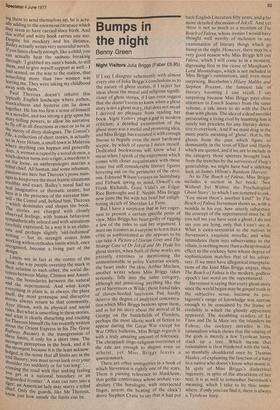Bumps in the night
Benny Green
Night Visitors Julia Briggs (Faber £6.95) If! say I disagree vehemently with almost every one of Julia Briggs's conclusions as to the nature of ghost stories, if I reject her ideas about the moral and religious significance of ghost stories, if I can even suggest that she doesn't seem to know when a ghost story is not a ghost story, that does not mean I derived no pleasure from reading her book. Night Visitors plugs a gap in modern criticism; a detailed examination of the ghost story was a useful and promising idea, and Miss Briggs has executed it with enough finesse to beguile even the most hardened sceptic, by which of course I mean myself. Dedicated bookworms will know what I mean when I speak of the enjoyment which comes with closer acquaintance with those lesser but still considerable literary figures hovering out on the perimeter of the obvious. Edmund Wilson's essays on Saintsbury and Firbank spring to mind, Orwell's on Frank Richards, Gore Vidal's on Edgar Rice Burroughs and E. Nesbit. Miss Briggs now joins the list with her, brief but enlightening sketch of Sheridan Le Fanu.
But I have a suspicion that in her eagerness to present a certain specific point of view, Miss Briggs has been guilty of rigging a few of the rules to suit her argument. I. must say it comes as a surprise to learn that a critic as sophisticated as she appears to be can take A Picture of Dorian Gray and The Strange Case of Dr Jekyll and Mr Hyde for ghost stories, when both of those works are patently exercises in mentioning the unmentionable in polite Victorian society, the beast under the skin. Arthur Machen, another writer whom Miss Briggs takes seriously, falls into the same category, although not possessing anything like the art of Stevenson or Wilde; those banal tales of cloven-hoofed lascivious Pan hardly deserve the degree of analytical concentration which Miss Briggs bestows upon them, and as for his story about the arrival of St George on the battlefields of Flanders, perhaps the most idiotic work of fiction to appear during the Great War except for War Office bulletins, Miss Briggs regards it with a truly amazing amount of tolerance. The cheapjack jingo-religious overtones of the tale are enough to disgust even an atheist, yet Miss Briggs leaves a questionmark.
There are other ambiguities in a book of which Stevenson is rightly one of the stars. There is passing reference to Markheim, that gothic contrivance whose archaic vocabulary ('the horologist, with interjected finger, arrests the beating of the clock') drove Stephen Crane to say that it had put
back English Literature fifty years, and a far more detailed discussion of Jekyll. And yet there is not so much as a mention of The Beach of Falesa, whose ironies I would have thought well worthy of inclusion in any examination of literary things which go bump in the night. However, there may be a very good reason why Miss Briggs left out Falesa, which I will come to in a moment, digressing first in the cause of Ma ugham's Lord Mountdrago, which is not included in Miss Briggs's ruminations, and, even more surprising, Beerbohm's Hilary Maltby and Stephen Braxton, the funniest tale of literary haunting I can recall. I say surprising because Miss Briggs pays close attention to Enoch Soames from the same volume, a tale more to do with the Devil than with ghosts. The idea of a dead novelist persecuting a living rival by haunting him is surely too priceless for any literary detective to overlook. And if we must drag in the more poetic meaning of 'ghost', that is, the ghosts from the past which figure so dominantly in the texts of Eliot and Hardy which are quoted, and if we are to include in the category those spectres brought back from the trenches by the survivors of Haig's generalship, we might have had a sidelong look at James Hilton's Random Hat vest.
As to The Beach of Falesa, Miss Briggs includes a section in her book: 'Not Withotit but Within: the Psychological Ghost Story', to which I am tempted to ask, 'You mean there's another kind?' In The Beach of Falesci Stevenson shows us, with a twinkle in his eye, how utterly subjective the concept of the supernatural must be. If you tell me you have seen a ghost, I do not say you are lying, only that I can't see it. What is extra-terrestrial to the natives in Stevenson's exquisite novella, and what intimidates them into subservience to the villain, is nothing more than a cheap musical effect to the cockney hero whose degree of sophistication matches that of his adversary. If we must have allegorical interpretations of the kind Miss Briggs enjoys, then The Beach of Falesa is the modern, godless epoch's last word on the supernatural.
Stevenson is saying that every ghost story since the world began may be gospel truth in the subjective sense, because its protagonist's range of knowledge was narrow enough to be contained by the frame of credulity in which the ghostly apparition appeared. The trembling readers of Le Fanu and De la Mare are the islanders on Falesa; the cockney intruder is the rationalism which shows that the singing of the gods is merely a few Tyrolean harps stuck up a tree. Which means that rationalism is then burdened with the task, so manfully shouldered once by Thomas Huxley, of explaining the function of a harp to a native who doesn't know what music is. In spite of Miss Briggs's dialectical ingenuity, in spite of the attractions of her text, it is as well to remember Stevenson's meaning, which I take to be this: somewhere, if only you can find it, there is always a Tyrolean harp.


































 Previous page
Previous page